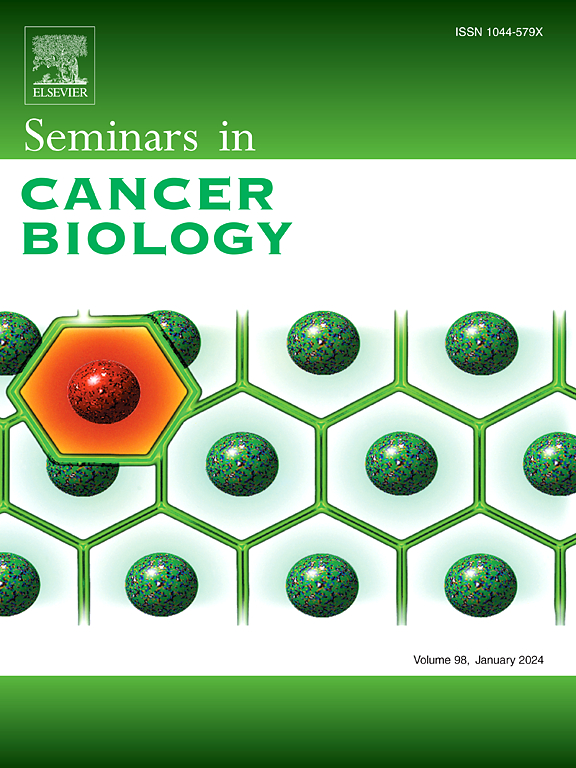Targeting intratumoral hypoxia to enhance anti-tumor immunity
IF 12.1
1区 医学
Q1 ONCOLOGY
引用次数: 0
Abstract
Cancers express a large battery of genes by which they establish an immunosuppressive tumor microenvironment. Many of these genes are induced by intratumoral hypoxia through transcriptional activation mediated by hypoxia-inducible factors HIF-1 and HIF-2. This review summarizes several recent reports describing hypoxia-induced mechanisms of immune evasion in sarcoma and breast, colorectal, hepatocellular, prostate and uterine cancer. These studies point to several novel therapeutic approaches to improve anti-tumor immunity and increase responses to immunotherapy.
靶向肿瘤内缺氧以增强抗肿瘤免疫。
癌症表达大量基因,通过这些基因建立免疫抑制的肿瘤微环境。这些基因中的许多是由肿瘤内缺氧通过缺氧诱导因子HIF-1和HIF-2介导的转录激活诱导的。这篇综述总结了最近几篇报道,这些报道描述了肉瘤和乳腺癌、结直肠癌、肝细胞癌、前列腺癌和子宫癌症中低氧诱导的免疫逃避机制。这些研究指出了几种新的治疗方法,以提高抗肿瘤免疫力并增加对免疫疗法的反应。
本文章由计算机程序翻译,如有差异,请以英文原文为准。
求助全文
约1分钟内获得全文
求助全文
来源期刊

Seminars in cancer biology
医学-肿瘤学
CiteScore
26.80
自引率
4.10%
发文量
347
审稿时长
15.1 weeks
期刊介绍:
Seminars in Cancer Biology (YSCBI) is a specialized review journal that focuses on the field of molecular oncology. Its primary objective is to keep scientists up-to-date with the latest developments in this field.
The journal adopts a thematic approach, dedicating each issue to an important topic of interest to cancer biologists. These topics cover a range of research areas, including the underlying genetic and molecular causes of cellular transformation and cancer, as well as the molecular basis of potential therapies.
To ensure the highest quality and expertise, every issue is supervised by a guest editor or editors who are internationally recognized experts in the respective field. Each issue features approximately eight to twelve authoritative invited reviews that cover various aspects of the chosen subject area.
The ultimate goal of each issue of YSCBI is to offer a cohesive, easily comprehensible, and engaging overview of the selected topic. The journal strives to provide scientists with a coordinated and lively examination of the latest developments in the field of molecular oncology.
 求助内容:
求助内容: 应助结果提醒方式:
应助结果提醒方式:


